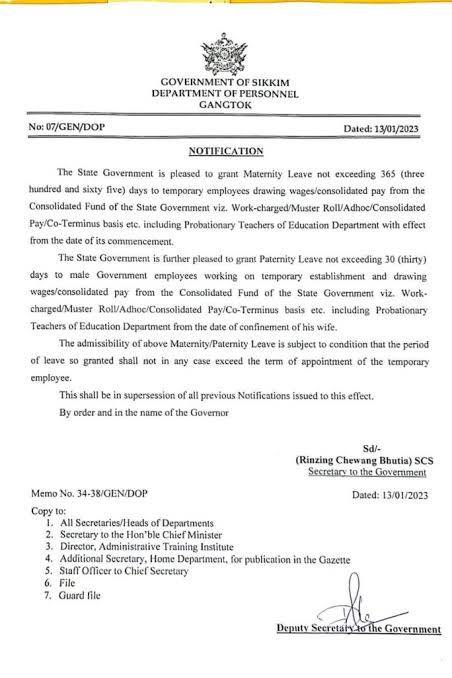Sikkim Government’s Progressive Measures Towards Work-Life Balance and Family Welfare
In a remarkable move towards promoting work-life balance and prioritizing family welfare, Sikkim Chief Minister Prem Singh Tamang declared on Wednesday that the state government will provide its employees with extended maternity and paternity leave benefits. Addressing the annual general meeting of the Sikkim State Civil Service Officers’ Association (SSCSOA), the Chief Minister vowed to introduce 12-month maternity leave and one-month paternity leave for government employees. He emphasized that necessary changes will be made to the service rules to facilitate the implementation of this progressive policy, and further details will be notified soon.
The announcement of such an extensive maternity leave policy comes as a groundbreaking decision that will elevate Sikkim as a pioneer in supporting the well-being of its workforce and ensuring adequate care for children and families. The proposed policy, nearly doubling the existing national standard, reflects the government’s commitment to nurturing and empowering its employees. By providing ample time for new mothers to bond with their infants and ease back into the workforce, this move is expected to have far-reaching positive effects on both personal and professional levels.

Acknowledging Fathers’ Role: Sikkim Introduces One-Month Paternity Leave for Government Employees
Moreover, the introduction of one-month paternity leave is a significant step towards acknowledging the crucial role fathers play in child-rearing. This progressive move demonstrates the state’s recognition of fathers’ responsibilities in their children’s lives, encouraging active participation in caregiving and fostering stronger family bonds. By actively supporting new parents, the Sikkim government aims to create a supportive and inclusive work environment that promotes gender equality and family values.
The decision to extend maternity and paternity leave is set to bolster the morale and productivity of the state’s workforce. Employees will now have the peace of mind to focus on their family responsibilities without compromising their career growth. This move is also expected to attract top talent, as job seekers prioritize employers that prioritize employee well-being and family welfare. By valuing their workforce’s personal lives, the Sikkim government is setting a positive example for businesses and organizations across the country.
Currently, the Maternity Benefit Act 1961 in India entitles working women to six months or 26 weeks of paid maternity leave. However, Sikkim seeks to go beyond the norm to ensure that its employees can adequately care for their children and families. The decision is expected to significantly benefit the state’s workforce, bolstering their well-being and fostering a positive work environment.
The policy’s implementation will require necessary amendments to the existing service rules to accommodate the extended leave durations. Chief Minister Tamang’s assurance that the changes will be implemented promptly reflects the government’s commitment to effecting these reforms effectively. Such proactive and timely action indicates the administration’s dedication to promptly addressing employee needs and concerns.
In addition to extending parental leave benefits, Chief Minister Tamang lauded the contributions of officers in the state administration’s growth and development. He recognized the pivotal role they play in shaping policies, managing government operations, and ensuring the welfare of citizens. The Chief Minister’s acknowledgment of their efforts reflects the government’s commitment to appreciating and supporting its workforce.
The government’s effort to streamline the promotion process for civil services officers is another testament to its commitment to nurturing talent and fostering professional growth. By ensuring a fair and transparent promotion process, the state government is encouraging officers to strive for excellence and take on greater responsibilities. This move is expected to enhance the efficiency and effectiveness of the state’s administrative machinery, contributing to Sikkim’s overall progress.
Moreover, Chief Minister Tamang extended his heartfelt congratulations to the newly appointed IAS and SCS officers during his address. This gesture highlights the government’s commitment to guiding and mentoring the next generation of civil service officers. Recognizing the significance of nurturing and empowering young officers, the government aims to foster a culture of excellence and dedication within the civil services.
In a separate initiative aimed at boosting the population of indigenous communities in Sikkim, the state government has previously decided to provide advance and additional increments to employees with two or three children, retroactive from January 1, 2023. The progressive approach adopted by the Sikkim government in addressing family welfare and incentivizing population growth reflects its commitment to fostering a thriving and inclusive society.
The decision to provide financial incentives to employees with two or three children aligns with the government’s vision of encouraging sustainable population growth. By offering additional increments, the government acknowledges the unique challenges faced by larger families and seeks to ease their financial burdens. This measure is not only aimed at supporting the well-being of existing families but also at encouraging the growth of indigenous communities.
Sikkim’s progressive approach to work-life balance and family welfare sets a positive precedent for other states and the country as a whole. By taking the lead in implementing extended maternity and paternity leave policies, the state government is signaling its commitment to prioritizing employee well-being. These decisions are likely to inspire other states and private organizations to reassess their leave policies and prioritize their workforce’s work-life balance.
In conclusion, the Sikkim government’s proactive measures towards work-life balance and family welfare reflect its commitment to nurturing a compassionate and inclusive society. By introducing 12-month maternity leave and one-month paternity leave, the government seeks to empower employees in their roles as parents and caregivers. Moreover, the decision to provide financial incentives for families with two or three children demonstrates the state’s dedication to encouraging sustainable population growth and supporting indigenous communities. As Sikkim takes these transformative steps, it is poised to emerge as a role model for other states in embracing progressive policies that prioritize employee well-being and family values.











